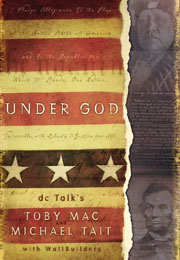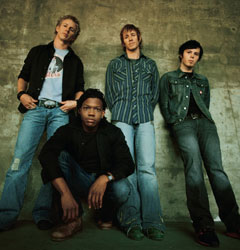| > cMusicWeb.com > Features > A dc Talk Solo Update > Part 3: Michael Tait |
|


[ september 2004 | interview by kim flanders ]
|
|
|||
|
|
|
|
|
|
THEMUSIC
|
|||
|
|
|||
|
|
|||
|
CURRENTS
|
|||
|
|
|||
|
|
|||
|
SEARCH
|
|||
|
|||
|
|
|||
|
cMUSICMAIL
|
|||
|
|||
|
|
|||
cMusicWeb.com: You were invited to tour earlier in the summer with guitar legend Santana. How was that, and is there anything that might happen beyond that?
Micheal Tait: Carlos and I have talked. He liked my latest record Lose This Life. He invited me out to hang out in California. It was an amazing time. Great artist. The European tour did not happen for various reasons. A big one obviously is conflicts with Tait's schedule and stuff. Some people thought I was crazy thinking, "You have Carlos Santana or Tait, which one are you going to take?" And I am thinking, "Let me think about that one really hard... Oh, it's Tait." You know, I missed a great opportunity but who knows what will happen in the future. It has been cool. The fact that he liked our music and saw it as a viable artistic expression — I'm beyond stoked.
cMW: Have you heard anything about another !Hero tour, and what was that like?
Michael: !Hero was a blast. We have talked about doing another tour. Whether or not it is going to happen — you know how stuff goes. It is such an intricate, huge, twenty-five member cast kind of thing. You have to convince more than Jesus to do this thing. I mean I play Hero sure enough but I have disciples and dancers and all kinds of people — including Rebecca St. James, the prostitute — to convince to do this tour again.
cMW: Can you tell us a little bit about Under God.
 Michael: Under God is a book that tobyMac and I are putting out in the Fall. It is a follow up to Jesus Freaks 1 and 2. It is obviously a different subject matter. It basically traces the spiritual history of our country, which are one in the same. Our history is spiritual for sure. So it is a spiritual history of our nation and how our forefathers actually had God at the center of their minds and hearts. They were Bible-believing, Judeo-Christian men — a lot of them. And they were interested in our country being built on Judeo-Christian principles as a foundation. And now we are trying to take God out of the plans — off of our money. It is pretty ironic when our forefathers would probably be rolling over in their graves saying, "What are you doing?" How much of the foundation — it is ok to change out the windows here and there or paint the building, but don't change the foundation or it will all crumble down.
Michael: Under God is a book that tobyMac and I are putting out in the Fall. It is a follow up to Jesus Freaks 1 and 2. It is obviously a different subject matter. It basically traces the spiritual history of our country, which are one in the same. Our history is spiritual for sure. So it is a spiritual history of our nation and how our forefathers actually had God at the center of their minds and hearts. They were Bible-believing, Judeo-Christian men — a lot of them. And they were interested in our country being built on Judeo-Christian principles as a foundation. And now we are trying to take God out of the plans — off of our money. It is pretty ironic when our forefathers would probably be rolling over in their graves saying, "What are you doing?" How much of the foundation — it is ok to change out the windows here and there or paint the building, but don't change the foundation or it will all crumble down.cMW: I heard you talk on a radio interview the other day about a revolving door of musicians in the band Tait. Sometimes when band members leave, a band decides to call it quits, while others just continue moving forward with new band members. What do you expect in the future for Tait [with recent band member changes]?
Michael: Well, obviously I am a very big part in the sound of Tait. I write the majority of the music and I work hard to make the band live sound great. So Tait will always be Michael Tait as the front — the band is named after my dad, of course, and myself. So I think me spearheading it — if I take off, then the band does change. If a member changes here and there, it does not affect it a bit. It is inconvenient for the first couple of weeks, of course, but it does not change a bit of my vision for this band. (looking to his right) And my all time lasting partner Chad Chapin has always been with us — he is on my side, my trusty side-kick. And we write a lot of stuff together. So it is really — the people that remain are the people that create the sound.
cMW: dc Talk had what at that time was called "crossover." I guess now the word is "going mainstream." Would you expect anything from Tait ever to go mainstream?
Michael: That is our prayer. Obviously making contact with Carlos Santana was a very big step for us and it was pretty cool. I say us because if it good for me, it is good for my band. And I believe [that] working with the guitarist for the band Evanescence is going to be a good thing. I don't know what might become of that, but we wrote a song together — singing it on his record. It is another outlet, you know. My eyes are always focused on that side, because I believe the church is already the converted. Do we neglect them? No. I am very much still a cheerleader and a choir member at the same time. But it is very important for me to reach outside the walls of our church because that is where the people are. They are out in the streets. Those are the ones we have to reach.
cMW: So what is new for Tait - any word on new CD's?
 Michael: New CD's, hopefully mainstream opportunities, who knows — maybe even a movie soundtrack. Maybe Chad, our drummer, will be in a movie. (laughs)
Michael: New CD's, hopefully mainstream opportunities, who knows — maybe even a movie soundtrack. Maybe Chad, our drummer, will be in a movie. (laughs)cMW: Here is a question about your experience. Years ago everyone moved to Nashville [to make it big], and now it seems like bands can live anywhere. What is your take on that?
Michael: Music is not territorial, I don't think. I think you can be influenced, but if you live in Butte Creek, Idaho, and you have a great sound, hey — Butte Creek, Idaho has a great sound. If you live in Florida, who knows. {A band in] Seattle had a sound for a while, Nelly on the hip-hop scene from St. Louis had a sound. It does not matter where you are, I think. It is what is in your heart and who you are with. Like a good pal. The Motel 6 in the middle of the sticks. It depends on who you are with that makes it fun and makes it happen.
cMW: About independent bands - a lot more people are thinking about going independent as opposed to going to a record label.
Michael: Well that is probably why the music industry is where it is now. I really believe the problem is very simple. And it is intricate and there is more to it, but on the surface it is very simple. There are more bands than fans. There is just too much music out there any more. And I say that as a musician — I really believe that. I mean, too much of anything cheapens everything. And that is where we are now. Everybody is a band. Everybody is a singer. Everybody is a performer. It does not make it special anymore. When our parents were kids, they latched onto a band, their record, all the songs, [and] their catalog. And nowadays a band will come through named Blah blah blah, and you get one song out of then and they are gone forever. Or there is no loyalty because there is so much out there. The independent way is probably the way to go if you are going to get into music at all, but it is also depressing to me as a veteran in this business to see music being taken so frivolously. There is no art in it any more. It is just a bunch of bull.
cMW: Explain "no art."
Michael: It's business. It is what sells. Back in the days [when] my parents heard a song on the radio — that moved them to buy the record. They did not see the faces. Now you could have a crappy song, and if you have a nice body and a good set of knockers, you can get on the radio, and you can get on TV, and you can sell records. And that is sad because it is not music, it is not art, it is fart.
- Kim Flanders
October 2004
October 2004
Articles written by the staff.
Maintained by WebMaster Dan Ficker.
Site Design by da Man
All Material © 1999-2005 Different Media LLC
Support cMusicWeb.com